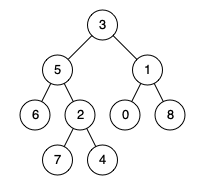Difficulty : Medium
Related Topics : Tree
Given a binary tree, find the lowest common ancestor (LCA) of two given nodes in the tree.
According to the definition of LCA on Wikipedia: “The lowest common ancestor is defined between two nodes p and q as the lowest node in T that has both p and q as descendants (where we allow a node to be a descendant of itself).”
Input: root = [3,5,1,6,2,0,8,null,null,7,4], p = 5, q = 1 Output: 3 Explanation: The LCA of nodes 5 and 1 is 3.Input: root = [3,5,1,6,2,0,8,null,null,7,4], p = 5, q = 4 Output: 5 Explanation: The LCA of nodes 5 and 4 is 5, since a node can be a descendant of itself according to the LCA definition.Input: root = [1,2], p = 1, q = 2 Output: 1
- The number of nodes in the tree is in the range
[2, 10^5].-10^9 <= Node.val <= 10^9- All
Node.valare unique.p != qpandqwill exist in the tree.
- mine
- Java
Runtime: 4 ms, faster than 100.00%, Memory Usage: 40.7 MB, less than 14.61% of Java online submissionsTreeNode res = null; public TreeNode lowestCommonAncestor(TreeNode root, TreeNode p, TreeNode q) { if(root == p || root == q) return root; dfs(root, p, q); return res; } TreeNode dfs(TreeNode node, TreeNode p, TreeNode q){ if(res != null || node == null) return null; if(p == node) { if(dfs(node, q)){ res = node; } return node; } TreeNode l = dfs(node.left, p , q); if(l == null && res == null){ l = dfs(node.right, p, q); } if(l != null && res == null){ if(dfs(node, q)){ res = node; } return node; } return null; } boolean dfs(TreeNode node, TreeNode q){ if(node == null) return false; if(node == q) return true; return dfs(node.left, q) || dfs(node.right, q); }
- Java
- the most votes
Runtime: 4 ms, faster than 100.00%, Memory Usage: 41.1 MB, less than 14.61% of Java online submissionspublic TreeNode lowestCommonAncestor(TreeNode root, TreeNode p, TreeNode q) { if (root == null || root == p || root == q) return root; TreeNode left = lowestCommonAncestor(root.left, p, q); TreeNode right = lowestCommonAncestor(root.right, p, q); return left == null ? right : right == null ? left : root; }
